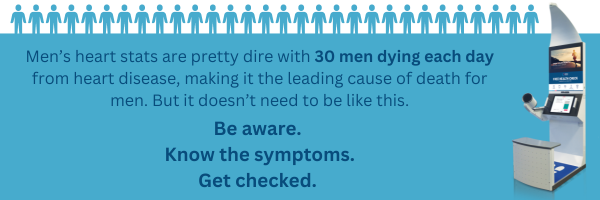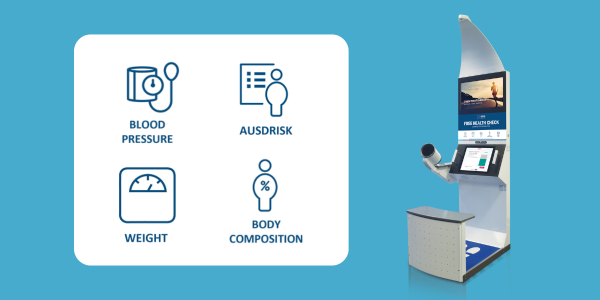Men's Health Week - How Men Can Combat Heart Disease
Heart disease is the leading cause of death for men in Australia, making it a critical focus for Men’s Health Week and beyond. The good news is that heart disease is largely preventable through simple lifestyle changes.
Knowing your numbers in the following areas and taking the appropriate action will lower a man’s risk of cardiovascular disease.
- Blood pressure
- BMI (body mass index)
- Cholesterol levels
- Blood sugar
Here are our tips to help you maintain your blood pressure and BMI, plus lower cholesterol levels and blood sugar.
Eat Heart Healthy Foods
- Fruits and Vegetables: Aim for at least five servings of fruits and vegetables daily. They are rich in vitamins, minerals and antioxidants that support heart health.
- Whole Grains: Whole grains like oats, quinoa and whole wheat bread are excellent sources of fibre, which can help lower cholesterol levels.
- Limit Saturated and Trans Fats: Reduce intake of red meat, full-fat dairy products and processed foods. Opt for healthier fats found in nuts, seeds, avocados and fish.
- Reduce Salt Intake: Excessive sodium can raise blood pressure. Aim for less than 2,300 milligrams of sodium per day, and choose fresh or minimally processed foods.
Regular Physical Activity
Regular exercise strengthens the heart muscle, improves blood circulation and helps maintain a healthy weight. Men should aim for:
- Aerobic Exercise: At least 150 minutes of moderate-intensity or 75 minutes of high-intensity aerobic exercise per week. Activities such as walking, running, cycling or swimming.
- Strength Training: Engage in muscle-strengthening activities at least two days a week. Lifting weights, resistance band exercises or body-weight exercises like push-ups and squats are beneficial.
Regular Health Screenings
Early detection of heart disease risk factors can lead to timely intervention and better outcomes. Regular check-ups should include:
- Blood Pressure Monitoring: High blood pressure is a silent killer, which is why regular monitoring and management is crucial.
- Cholesterol Levels: High cholesterol can lead to artery blockage. Regular screenings can help manage cholesterol levels through diet, exercise or medication if necessary.
- Blood Sugar Levels: Diabetes is a significant risk factor for heart disease. Regular testing can help manage blood sugar levels.
Avoid Tobacco and Limit Alcohol
Smoking and excessive alcohol consumption are major risk factors for heart disease. To reduce these risks:
- Quit/Reduce Smoking: Even secondhand smoke can be harmful, so avoiding environments where smoking is prevalent is ideal.
- Limit Alcohol: Drink in moderation and try and have alcohol-free days.
Manage Stress
Chronic stress can contribute to heart disease by raising blood pressure and leading to unhealthy coping mechanisms such as overeating or smoking. Effective stress management techniques include:
- Mindfulness and Meditation: Meditation, yoga and deep-breathing exercises can help reduce stress levels.
- Physical Activity: Regular exercise is not only good for the body but also for mental wellbeing.
- Adequate Sleep: Aim for 7-9 hours of quality sleep each night. Poor sleep can negatively affect heart health.
Maintain a Healthy Weight
Maintaining a healthy weight reduces the burden on the heart. Combine diet and exercise to achieve and maintain a healthy body weight, body composition and BMI (all checks available on the SiSU Health Station).
What the SiSU Health Station can check
The SiSU Health Station completes a comprehensive and non-invasive check on the following areas.
- Blood pressure
- Heart rate
- BMI
- Body fat percentage
- Diabetes Risk
The SiSU Health Station provides a great snapshot into your health and risk areas in 4 minutes and is free. Most commonly found in Priceline Pharmacies, after the health check you can ask the pharmacist to check your cholesterol and blood sugar levels for a complete analysis on your health.
This Men’s Health Week, take proactive steps to combat heart disease. Small changes can lead to significant health benefits, paving the way for a longer, healthier life.
Remember, it’s never too late to start making heart-healthy choices.
Find your closest SiSU Health Station here.

